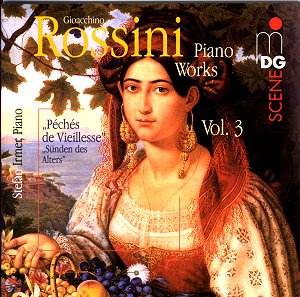In 1855 Rossini moved to Paris, an act that enabled
him to recover from twenty years of physical illness and mental exhaustion.
As his health recovered, his sense of humour improved and he began to
compose once again. The result was not a series of operas to match those
earlier in his career, but much vocal and piano music. Of over 150 piano
pieces, many of the shortest were performed at Rossini’s ‘Samedi soirs’,
informal concerts involving many of the great artists and public figures
living in or passing through Paris at that time.
The music on this enterprising release (volume three
of what one assumes will become a complete survey of Rossini’s output
for piano, the first of its kind) comes from books four to six of ‘Pêches
de Vieillesse’ (‘Sins of old age’). Rossini’s subtitle ‘A little bit
of everything. A collection of 56 semi-comic pieces for piano’ is a
good indicator of what to expect; ironic parodies of contemporary music
and tributes to composers of an earlier age. The pieces contain wit,
grace and charm, sharp parody and a measure of sentiment. As such they
can be seen as an influence on Saint-Saëns, Satie and particularly
Poulenc (whose ‘Les Soirées de Nazelles’ similarly originates
from informal gatherings).
Irmer opens this recital with ‘Un Sauté’. Despite
the culinary orientation of its title, this charming waltz falls most
obviously into the category of ‘tribute’, recalling Schubert; a waltz
with a hint of the barracks via the March Militaire. The unexpected
modulations also have a Schubertian feel and the whole number is dispatched
with a knowing simplicity that makes an irresistible start to the disc.
The following item sees Rossini poking fun at himself. ‘Un Rêve’
is not the kind of dream one would expect of impressionists such as
Debussy. Instead Rossini appears to be dreaming up an entire operatic
overture; and the model is, without a doubt, his own Guillaume Tell.
A lyrical opening subject leads to a cascading storm, followed by a
further lyrical episode and, to conclude, a gallop of the type heard
in the famous overture. The whole thing is wildly excessive, the storm
elements having the granite-hewn splendour of Beethoven. Irmer makes
the most of the dynamic and expressive contrasts and his opening is
magical in its timing and colouration.
Anyone listening to this disc will probably have made
their mind up at this point about whether or not Rossini’s piano music
warrants much attention. I for one was convinced and further exploration
revealed much to enjoy, served handsomely by Irmer’s enchanting performances.
He has the full measure of Rossini’s often demanding writing (the composer,
who premiered most of these works himself, described himself as ‘a pianist
of the fourth class’, an example of false modesty if ever there was
one) and brings each vignette to life with sparkle, wit and the kind
of carefree joviality that would surely have made the composer smile.
Further highlights are in such abundance that in-depth
discussion is impossible (and would to some extent ruin the wonderful
voyage of discovery that is to be had from this music). Suffice it to
say that Rossini’s apparent reverence for J.S. Bach is revealed in the
‘Prélude prétentieux’. The variously modulating introduction
leads to a fugal subject and development that embrace one contrapuntal
cliché after another.
While it may seem that to appreciate this music fully
one has to understand the wealth of cross references and parodies present
throughout the disc, this is certainly not the case. For example, the
Etude Asthmatique: a short semiquaver motif is heard ad infinitum
until it appears to run out of breath. However, even if the piece were
merely title ‘Etude’ it would still exhibit the appealing freshness
of Rossini’s melodic and harmonic style. Of course, if the underlying
meaning of each piece is important to the listener, the excellent booklet
notes are highly useful.
To sum up? This disc is an hour’s worth of sheer, unexpected
delight, performed with great panache, commitment and technical authority
by Irmer. While one may baulk at paying full-price for such obscure
repertoire (the kind that Naxos are wont to record) it is worth every
penny and, in terms of performance, is unlikely to be equalled. As mentioned,
MDG provide an informative booklet note (by Irmer himself) and the disc’s
presentation is attractive - though what the rather sour looking Italian
lady on the cover has to add to the proceedings is a matter for speculation.
She surely hadn’t heard any Rossini when she consented to being painted.
Owen Walton


